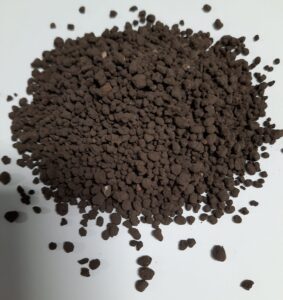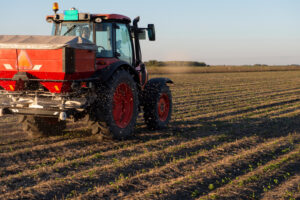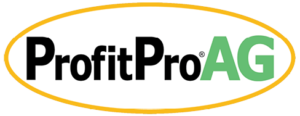Get More for Your Fertilizer Dollar 5 Reasons to Try Soft Rock Phosphate
 Sick of soaring fertilizer prices? If you want more for your money than the standard options from the co-op, it’s time to look at soft rock phosphate (SRP).
Sick of soaring fertilizer prices? If you want more for your money than the standard options from the co-op, it’s time to look at soft rock phosphate (SRP).
“Fertilizer prices are 15% to 18% higher than last year,” said Dennis Klockenga, a crops specialist with ProfitProAG. “If you’ve got high pH, high calcium, or high magnesium in your soil, SRP can be a great phosphorus source.”
For years, many suppliers have promoted MAP (monoammonium phosphate) and DAP (diammonium phosphate) for farmers’ phosphorus needs. MAP and DAP are acid-treated, meaning the manufacturers strip everything from the product to create a highly concentrated phosphorus source. (MAP is 11-52-0, while DAP is 18-46-0).
“The more concentrated something is, the more the supplier can charge for it,” Klockenga noted.
MAP and DAP are quick-release fertilizers. “They’re like a bottle rocket going off,” said Klockenga, who added that only 10% to 15% of the phosphate is released, however. “My question—is the other 90% available next year? Not unless you have the microbes to solubilize it.”
SRP offers an effective alternative. “SRP is nature’s slow-release fertilizer,” Klockenga said. “It doesn’t tie up in high pH, high calcium, or high magnesium soils. It’s also better for the biology and works well with regenerative ag.”
What is SRP?
SRP is a natural product that formed millions of years ago in parts of the western United States. Nature left phosphate residues from marine life that thrived in the region tens of thousands of years ago. Today, this elemental phosphorus is mined in Idaho.
SRP is beneficial whether you raise corn, soybeans, alfalfa/pastures, or other crops, noted Klockenga, who shares five big reasons to try SRP:
- More bang for your buck. SRP contains nearly half the elements on the periodic table. Along with phosphorus, there are approximately 55 trace minerals in SRP, including boron and other essential nutrients vital to plant growth and health. SRP from ProfitProAG also contains 31% calcium, Klockenga said. The calcium and phosphorus don’t “marry up” to form rock phosphate, though, which isn’t plant-available. SRP enables the beneficial soil biology to make the nutrients readily available to the crop.
- Fast results from a slow release. The phosphate, carbon, and other nutrients in SRP are in colloidal compounds. They’re not water-soluble, but they stay in suspension, just like the dust particles you see in the air when the sun shines in a room. These colloidal compounds in SRP are so fine that they fit into gaps in the molecules in water. This means they are 100% available to plants. You’re able to build phosphorus levels better with SRP compared to MAP or DAP, too.
You don’t have to wait to see results after applying SRP, said Minnesota farmer Matt Wangen, who has used SRP for years. “The nutrients in the SRP are a lot more available in year one, compared to other phosphorus fertilizers out there,” said Wangen. “That means you can sometimes apply less SRP per acre.” - Higher test weights. The employees at the elevator comment on the test weight of Wangen’s corn, which often reaches the 59 to 60+ pound range. Wangen started using SRP from ProfitProAG around 2017-18, when he applied it to the soybean ground he was planting corn the next growing season. “That was some of the best corn I’ve ever grown,” said Wangen, who farms near Albert Lea, Minnesota. “A lot of the corn yielded 285 bushels per acre, and two varieties went over 300 bushels.” He continues to use SRP because he likes the results he gets year after year.
- Environmental benefits. SRP improves electromagnetism in the soil, which offers erosion resistance. Nutrients stay put in the soil, plus SRP holds these nutrients in the root zone. “SRP is less likely to be lost, compared to traditional phosphorus sources,” Klockenga said. “This helps you avoid the ‘more-on philosophy,’ where you pour on more fertilizer to try to get better results.”
- Nutrient-dense food. SRP is one of the management practices Wangen uses to keep his corn plants green from top to bottom longer into the fall. “The longer the plants stay green, the more they continue to add test weight. I’ve also found that the storability of the grain is better, plus the grain is more nutrient-dense.” Research has shown that calcium and phosphorus offer the best way to raise the Brix level in crops, Klockenga noted. For plants, Brix is an indicator of the sugar and mineral content, reflecting the overall health and energy reserves of the crop. That translates into higher yield potential and heavier test weights, which means more profit.
 Put SRP to work on your acres
Put SRP to work on your acres
SRP can be applied in the fall. SRP from ProfitProAG comes in fertilizer pellets you can apply with a regular fertilizer spreader or a strip-till machine. The product is shipped in 2,200-pound bulk bags on pallets that can be moved easily with telehandlers.
Don’t remain a hostage to high fertilizer prices and sub-par results. “If you’re reassessing your fertilizer inputs, SRP is a great option,” Klockenga said.
To learn more about SRP, contact Dennis Klockenga at 320-333-1608 or dklockenga@profitproag.com.
Office – 507-373-2550 / info@profitproag.com
Dr. Jim Ladlie – 507-383-1325 / jladlie@profitproag.com
Dennis Klockenga – 320-333-1608 / dklockenga@profitproag.com
Chris Chodur – 507-402-4195 / cchodur@profitproag.com
